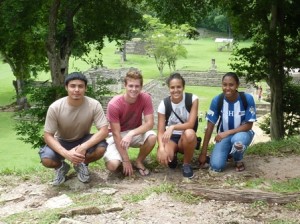
Michael Trejo ’12 (left), Dan Moran ’12, Gabi Lachapel ’12, and Joelle Neilson ’12 at a Mayan ruin in Honduras.
Before he traveled to Honduras and began the grueling work of digging into the earth and lugging wood and rocks to build latrines, even before he had learned much about sustainable development, Michael Trejo ’12 blithely told friends and family that he’d be spending his summer “making sure rural communities are getting clean water.”
By June 12, after only the first week of a National Science Foundation-funded International Research Education for Students (IRES) course, Trejo wrote in a blog that his early assumption was “a huge understatement.”
This summer, four students all found themselves challenging early assumptions and learning about far more than engineering: Gabi Lachapel ’12 (Fair Lawn, N.J.), a double major in engineering studies and economics, Dan Moran ’12 (East Blue Hill, Maine), a civil engineering major, and engineering studies majors Joelle Neilson ’12 (Philadelphia, Pa.) and Trejo (Falls Church, Va.)
Taught by Sharon Jones, professor of civil and environmental engineering, the Sustainable Development of Water and Sanitation Systems in Honduras course was comprised of two weeks of prep work on campus, four weeks of field work in Honduras, and four more weeks of data analysis at Lafayette. For the last two portions, Lafayette students worked side by side with a student team from Honduras. This is the first in a three-summer series funded by the NSF.
The students will present reports of their experiences Oct. 20 as part of the College’s interdisciplinary seminar series.
Over the summer, the students began with three weeks of reading, watching documentaries, and discussing how sustainable water systems in developing countries work and how politics and history have affected people’s lives. Meanwhile, at the Autonomous University of Honduras in Sula Valley, Diana Enamorado, Carmen Elena Martinez, Alex Rivera, and Fernando Zuniga were doing the same, guided by engineer Diana Betancourt of the nonprofit Water for People.
During the next four weeks, all eight students lived, worked, and studied together in Honduras, monitoring water, collecting data, and constructing latrines in impoverished rural villages in the mountains.
“It was one of, if not the, best educational experiences I’ve ever had,” Jones says, explaining that in four weeks of learning, designing, and building, she and the students found themselves bonding and discussing all sorts of issues and opportunities. “If you’re immersed for four weeks with the students, you just develop a different relationship with them … it’s a rare experience.”
In those four weeks, the students learned about the difficulties rural farmers face in securing clean water for drinking, cooking, and bathing—and, beyond all early expectations, they learned how to design and build several kinds of low-cost outdoor latrines designed to improve water safety and, consequently, lives.
“The students were working side by side with community members,” Jones says, explaining that their work days usually lasted 12 hours or more. “They wanted to finish, and they wanted to finish perfectly. They were really good troopers.”
Jones says both she and the students learned the similarities they shared with the Honduran students, who came from cities and had experienced as little of rural Honduran life as the American students. She says the students also learned about their similarities to the Honduran villagers and “the shared perseverance of the people and their hardworking nature.”
“We learned they care for their children and their families and the future,” she says. “I think that had an impact on all of us. We learned that poverty is just a horrible thing, no matter where it is.”
By the time the eight students left Honduras for three weeks of further study, report writing, and field trips at Lafayette, the Lafayette students all found themselves blogging about how much they would miss Honduras and remember their experience.
“As I watched Honduras fade into the distance out of the window of our plane, I was struck by how lucky I was to have been given this opportunity,” Moran wrote. “The experiences I had, the people I met, the things I learned would not have been possible if I were a tourist visiting the country or a student studying these subjects back in the U.S. Not many people get to do something so interesting and rewarding for their summer job, and I don’t take that for granted.”
By the end of the last three weeks, the students were already putting their experience into perspective.
“As I looked back at the beginning of the summer, I started to see how much I have grown,” Neilson wrote in her blog. “In the working field, I learned the significance of sanitation, clean water, and hygiene and how they are all closely related. I learned how to respect and embody another culture and view their perspective in a different light. Not only have I grown as a student, I have also grown as a person.”

1 Comment
Comments are closed.